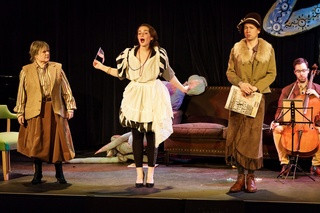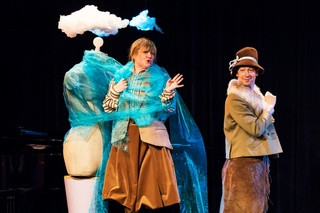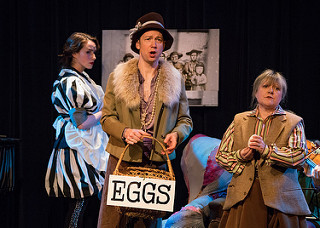|
Back
Four Singers In Three Acts New York
Peter Norton Symphony Space
02/09/2018 - & February 10, 11, 2018
Daniel Thomas Davis: Six.Twenty.Outrageous.: Three Gertrude Stein Plays in the Shape of an Opera
Jacqueline Horner Kwiatek (V), Andrew Fuchs (Me), Ariadne Greif (Three), Joseph Atkins (We)
Momenta Quartet: Emilie-Anne Gendron , Alex Shiozaki (Violins), Stephanie Griffin (Viola), Michael Hass (Cello), Dimitri Dover (Piano), David Bloom (Musical Director)
Doug Fitch (Director/Designer), Kate Elswit (Choreographer), Misha Igoshin (Creative Scenic Fabrications), Ben Manley (Sound Engineer), Adam Frank (“Radio Free Stein” Producer)

J. Horner-Kwiatek, A. Greif, J. Atkins, M. Haas (© AOP Images)
“There is every reason to suppose that (Gertrude Stein) used her subjects as a painter does is models, sometimes revealing them for recognition and at other times concealing them under an elaboration of contrasts, puns, and rhythmic patterns...”
Virgil Thomson
The opera Six.Twenty.Outrageous, which had its world premiere at Symphony Space last night is a glittering production, with scintillating music, and an original concept, based upon Gertrude Stein’s words. So one hesitates in pouring water on the opera. Thus, before the plaudits (which are numerous) one must note that Ms. Stein, while labeled with abundant adjectives, was never called cute. And Six.Twenty.Outrageous. initially has a cuteness which belies the purpose of its author.
Elaboration on this is of little consequence. Not primarily because librettist Adam Frank, is a noted expert on Ms. Stein. But because the opera is such a gorgeous high-class entertainment that fidelity is not of vital importance.
Even more, as Virgil Thomson once said (and I’m quoting from memory), “Gertrude Stein loved having her words set to music–though she wasn’t terribly musical herself.”
So outside of the preciousness of a drawing-room comedy maidservant, and three characters who pranced around like figures in a Krazy Kat cartoon, she might well have approved Daniel Thomas Davis’ music, the singularity of the staging, and the perfection from all the musicians.

J. Horner-Kwiatek, A. Fuchs (© AOP Images)
While we have only four characters, and the music is for string quartet and piano (all of whom become part of the action), this is no chamber opera. It is a spectacle. So spectacular, in fact, the words are secondary.
The set is a black curtain dominated by a huge Picasso painting. And within the three acts and 15 scenes (all introduced with posters), we have a photograph which comes alive as old immigrant pictures are picked out and put on a boat. We have an old-fashioned Victrola and giant radio playing outlandish sounds. We have a mannequin which lights up, which is decked out with turquoise-blue gauze, the inspiration for seduction. We have an American election with flag-waving. And we have a murder at the end, the body resurrecting itself to sing.
Plus, in this uncohesive action of a supposed household (perhaps Ms. Stein, her lover Alice Toklas, and the aforesaid maid), the Momenta String Quartet enters, plays on either side of the stage, come together in the second act, dance and act. As well as Dimitri Dover, the engaging piano player who is part of the action and gives impetus to the music.
What does one understand after almost two hours? Librettist Adam Frank has taken three Gertrude Stein “plays”, elaborating on the words, adding the cartoon-like or morbid or emotional action and given us–like Ms. Stein herself–enigmas, cryptic words, repetitions, and (in the quote from the program–enjoyment.
“If you enjoy it, you understand it.”
And oh, I did enjoy it. Thoroughly. The movements were part Krazy Kat, the absurdity was more Ionesco than Stein. Yet the production was irresistible. Of the couple in abnormal, aberrant household, we had the diminutive Jacqueline Horner-Kwiatek, as the Stein character, prancing, jumping, with a gorgeous soprano. The Toklas lady was Andrew Fuchs, dressed in 1920’s Flappers Dress, his voice a marvel of deep baritone to a high–never falsetto–alto. And the dusting, dancing, most physical maidservant, Ariadne Greif exaggerating, electrically going up to the top of the soprano range.
Add to this Joseph Atkins, originally the man who shows the billboards with titles, but in the Third Act becoming both narrator and...well, fur-coated killer.

A.Greif, J. Atkins, J. Horner-Kwiatek (© AOP Images)
This, though, was no opera for soloists. Daniel Thomas Davis is such a consummate composer, a man who knows his voice like a Rorem or a Lang, that virtually every number was ensemble number. With string quartet, with piano, with duos and quartets. The style is light, light-hearted with an exquisite sense of both melody and harmony. This is perfection music-making. At times it sounds like Bernstein’s Trouble in Tahiti, at times like Paul Bowles rarely-performed (alas) Picnic Cantata. Yet with an originality erupting from obvious confidence.
But how does it resemble Virgil Thomson’s one complete Gertrude Stein libretto, Four Saints in Three Acts? It lacks Thomson’s sometimes ersatz folk/hymn tunes, yet it continues that so-difficult simplicity in setting words with the most consummate care. A care which is reflected in this whole stunning production.
A few months ago, I saw an upstate production of Four Saints, sung beautifully, but presented in a huge hall. The director thought of using the entire space of the hall to break up the numerous characters, musicians, words, harmonies, melodies. And thereby separating that magical cohesiveness of Gertrude Stein’s own words.
Six.Twenty. Outrageous. was the opposite. Director/Designer Douglas Fitch deliberately placed musicians and singers in forms which were hardly geometric, which frequently made no sense. Yet which consistently emphasized the cultivated, blithe and, yes, graceful music.
For that alone, one must be thankful for such a joyous experience. Ms. Stein, I feel, might have had questions how her words were used. But composer Davis used his notes with the care and expressiveness that any poet would relish.
Harry Rolnick
|